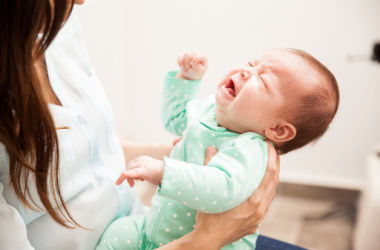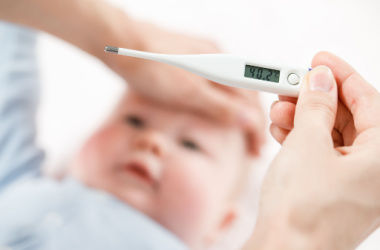Mom & Baby Care
Is Your Baby Having A Fever? Know When To Worry
By Apollo 24|7, Published on- 22 August 2022, Updated on -18 October 2022
Share this article
0
0 like

For parents, especially first-time ones, fever may be an extremely frightening experience. If your child has a fever, you might start wondering how high is too high or whether you need to call the doctor right away. Doctors state regardless of how careful you are, every child will ultimately develop a fever. And it's critical that parents understand what to do in such a situation.
Why do babies get fever?
Even though fever is a sign of a disease, it is not an actual illness. A fever often indicates that the immune system is active and that the body is battling an infection. When your infant gets a fever, it typically indicates that they have caught a cold or have another viral infection. Even though they are less frequent in children, fever can be brought on by pneumonia, ear infections, urinary tract infections, or a more severe infection like meningitis or a blood bacterial infection. Other reasons for infant fever include:
- Vaccination-related reactions
- Being too warmly attired
- Spending too much time outdoors on a hot day (overheating the body)
Baby fever: What are the symptoms?
During fever, your infant can become angrier and fussier than usual. Other signs may include:
- Sleeping at odd times
- Not eating properly
- Playing with less enthusiasm
- Being less energetic or even sleepy
- Seizures or convulsions
How do I check the temperature of my baby?
There are several ways to take a child's temperature: rectally, orally, via the mouth, through the ear, under the arm (axillary), or at the temples. Doctors recommend the use of digital thermometers to reduce the risk of mercury exposure and poisoning from using mercury thermometers. The most reliable temperature readings come from rectal thermometers, which are also sometimes the simplest to use on a baby. This is how you can do it:
- Make sure the thermometer is clean before taking a rectal temperature. Rub it with alcohol or clean it with soap and water. Lay your infant on their back or belly, with their legs bent inward toward the chest.
- Put some petroleum jelly on the thermometer bulb's surrounding area before carefully inserting it into the rectal orifice. Hold the digital thermometer in place until you hear the beep, which should take around 2 minutes. After that, carefully take out the thermometer to take the temperature.
At what temperature do I know if my baby has a fever?
The typical temperature of a newborn is between 97 and 100.3 degrees Fahrenheit (℉). Most medical professionals define a fever as a rectal temperature of 100.4℉ or greater.
When to worry?
Call your doctor if your infant:
- has a fever and is under 2 or 3 months old
- becomes drowsy or unresponsive
- has difficulties eating or breathing
- is extremely irritable, fussy, or challenging to settle down
- develops rashes
- has a seizure and displays symptoms of dehydration, which include less wet diapers, a dry mouth, no tears when weeping, or a sunken soft region on the head

Identifying whether a baby has a simple virus (like a cold) or a more severe illness can be challenging for doctors (like a UTI, pneumonia, or meningitis). Therefore, doctors may prescribe specialized testing such as blood or urine tests, a chest X-ray, or a spinal tap to determine the underlying cause.
What should you do if your baby has a fever?
Call your child's doctor straight away if your infant develops a fever and is younger than one month old. Try these suggestions for older babies:
- Give your baby a lukewarm water bath. Before bathing your child, always test the water's temperature on your wrist.
- Dress your infant in a thin layer of clothing.
- Make sure your infant gets enough liquids to stay hydrated. Depending on the baby's age, babies can be given water, breast milk, formula, or an electrolyte solution. Consult your baby's paediatrician for better recommendations.
- Do not self-medicate the child without consulting a doctor.
Make sure you have a notebook and pen handy before calling the doctor about your infant. Also, be prepared with your pharmacy's contact details to avoid any delays. To know more,
Consult An Apollo Paediatrician
Medically reviewed by Dr Sonia Bhatt.
Mom & Baby Care
Leave Comment
Recommended for you

Mom & Baby Care
Second Trimester Diet: Here’s What To Eat And What To Avoid
Eating carefully during the second trimester of pregnancy can help in preventing various complications such as premature birth, and preeclampsia. Hence, it is necessary to eat food items that are rich in protein, calcium, and folate during this time.

Mom & Baby Care
This Immunization Week Learn About The 6 In 1 Vaccine For Babies
Read to know more about the new 6 in 1 vaccine that would help boost your newborn's immunity against several diseases.

Mom & Baby Care
Diaper 101: How To Choose The Right Diaper For Your Kids?
Kids' diapers are essential till your toddler gains bowel and bladder control. But how to choose the right diaper is a thing to discuss. This blog highlights everything you need to know about diapers, from size to absorbency and leak protection.
Subscribe
Sign up for our free Health Library Daily Newsletter
Get doctor-approved health tips, news, and more.

